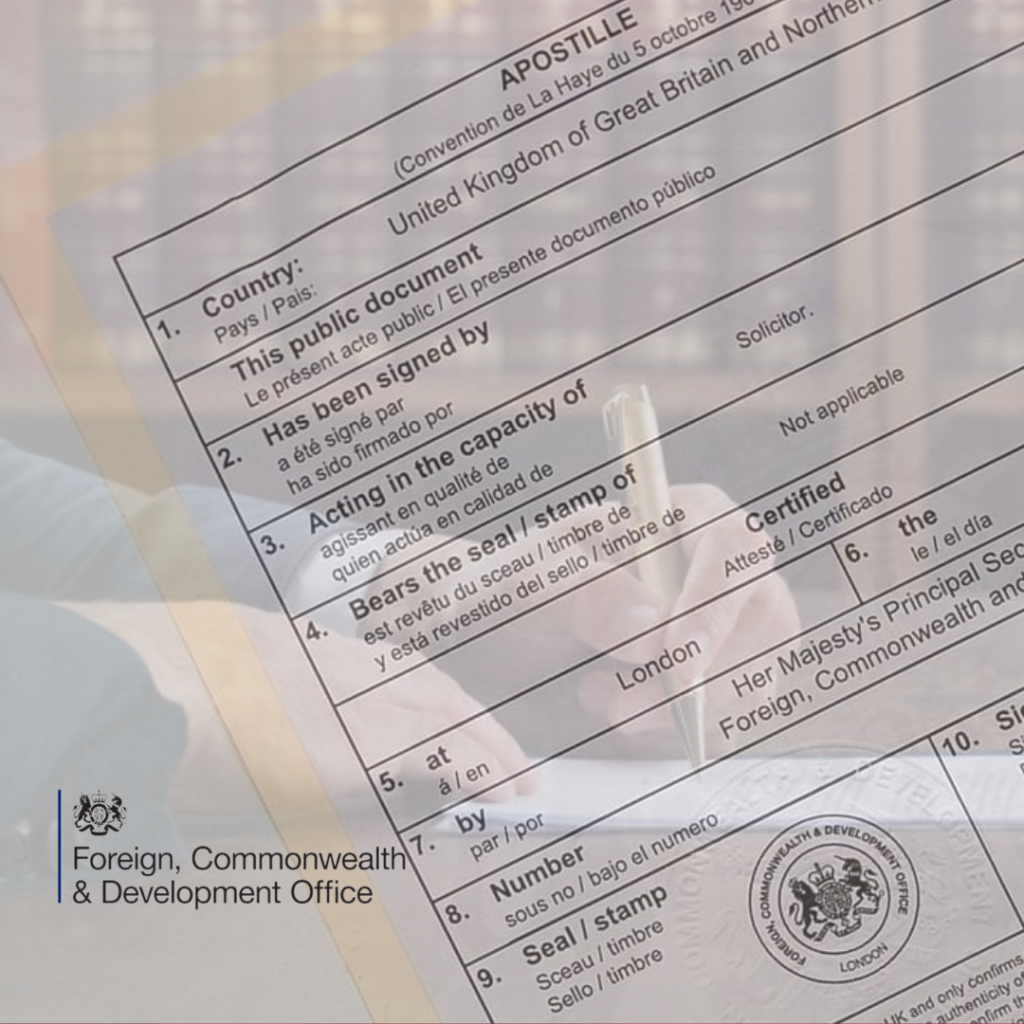
Apostille Service
Registered with the UK Foreign, Commonwealth & Development Office
Not only can we assist you with obtaining an apostille in the UK, but we also partner with a network of trusted specialists across Europe. With extensive experience liaising with government departments and ministries, our partners enable us to provide reliable apostille services throughout Europe.
From £138 per document
Email: apostille@ginkgoadvisory.com
Apostille is the process of making a document valid for international use by confirming its authenticity.
Your documents are safely hand-processed, and we liaise directly with solicitors and the UK Foreign, Commonwealth & Development Office (FCDO).
By using secure couriers and handling all the steps on your behalf, we provide the quickest and most straightforward way to legalise documents.
All across Europe. We can arrange apostilles in every European jurisdiction that applies the Hague Apostille Convention, and handle consular legalisation for the few special cases. Our coverage includes:
– EU/EEA, Switzerland & UK: Austria, Belgium, Bulgaria, Croatia, Cyprus, Czech Republic, Denmark (incl. Faroe Islands), Estonia, Finland, France, Germany, Greece, Hungary, Iceland, Ireland, Italy, Latvia, Liechtenstein, Lithuania, Luxembourg, Malta, Netherlands, Norway, Poland, Portugal, Romania, Slovakia, Slovenia, Spain, Sweden, Switzerland, United Kingdom.
– UK Crown Dependencies & European UK Territories: Guernsey, Jersey, Isle of Man, Gibraltar.
Some documents are not issued with an official government signature, stamp, or seal that the FCDO can recognise directly. In these cases, the document must first be certified by a UK solicitor.
The solicitor confirms the document is genuine and adds their signature. Once this step is complete, the FCDO can issue the apostille.
Common examples include:
– Academic certificates and transcripts
– Powers of attorney
– Company documents and contracts
– Copies of passports or ID documents
Without solicitor certification, the FCDO will reject these documents for apostille.
Yes. We guarantee to issue the apostille on any genuine UK document that is correctly prepared.
If your document is missing a required signature, stamp, or certification, we will assist you in resolving the issue.
In the rare event that we are unable to obtain the apostille, we will refund the apostille fee in full.
No. Apostilles do not expire — they remain valid indefinitely once issued. Each apostille shows the date of issue but has no expiry date.
However, some authorities may only accept documents (and their apostilles) that are recent, usually within the last 3 months. This is common for:
– Criminal record checks / background checks
– Statutory declarations and affidavits
– Certificates of no impediment
– Certain embassy submissions
If you are unsure, please confirm with the requesting authority whether they require a recently issued apostille.
Yes. The apostille we provide is the official government-issued certificate, recognised in all Hague Convention member countries and many others.
All apostilles are issued by the UK government through the Foreign, Commonwealth & Development Office (FCDO). As a recognised service provider, we hand-deliver documents to the FCDO daily, ensuring a safe and fast process.
The countries listed below are participants of the Apostille Convention (Hague Treaty Convention 12). An apostille issued in one member country is recognised in all others.
The official list is maintained by the Hague Conference on Private International Law and can be found here: Hague Conference – Apostille Convention Status Table
A–B
Albania, Andorra, Antigua and Barbuda, Argentina, Armenia, Australia, Austria, Azerbaijan, Bahamas, Bahrain, Bangladesh, Barbados, Belarus, Belgium, Belize, Bolivia, Bosnia and Herzegovina, Botswana, Brazil, Brunei Darussalam, Bulgaria, Burundi
C
Canada, Cape Verde, Chile, China (including Hong Kong & Macao SARs), Colombia, Cook Islands, Costa Rica, Croatia, Cyprus, Czech Republic
D–G
Denmark, Dominica, Dominican Republic, Ecuador, El Salvador, Estonia, Fiji, Finland, France, Georgia, Germany, Greece, Grenada, Guatemala, Guyana
H–I
Honduras, Hungary, Iceland, India, Indonesia, Ireland, Israel, Italy
J–K
Japan, Jamaica, Kazakhstan, Republic of Korea, Kosovo, Kyrgyzstan
L–M
Latvia, Lesotho, Liberia, Liechtenstein, Lithuania, Luxembourg, Malawi, Malta, Marshall Islands, Mauritius, Mexico, Moldova, Monaco, Mongolia, Montenegro, Morocco
N–O
Namibia, Netherlands, New Zealand, Nicaragua, Niue, North Macedonia, Norway, Oman
P–R
Pakistan, Palau, Panama, Paraguay, Peru, Philippines, Poland, Portugal, Romania, Russian Federation, Rwanda
S
Saint Kitts and Nevis, Saint Lucia, Saint Vincent and the Grenadines, Samoa, San Marino, Sao Tome and Principe, Saudi Arabia, Senegal, Serbia, Seychelles, Singapore, Slovakia, Slovenia, South Africa, Spain, Suriname, Swaziland, Sweden, Switzerland
T–U
Tajikistan, Tonga, Trinidad and Tobago, Tunisia, Turkey, Ukraine, United Kingdom, Uruguay, Uzbekistan
V
Vanuatu, Venezuela
It depends on the type of document and the requirements of the authority requesting it:
– Original required: Some documents, such as birth and marriage certificates or criminal record checks, must be apostilled in their original form.
– Copy accepted: Other documents, such as academic certificates, can usually be apostilled on a certified copy.
If you are unsure whether an original or copy is required, please confirm with the requesting authority before placing your order.
We aim to complete all orders within a few working days once your documents reach our office.
Delays can occasionally occur if:
– A document is not signed correctly
– The signatory is not recognised by the FCDO
– There are unforeseen FCDO processing delays
If this happens, a member of our team will contact you and advise on the next steps.
For urgent orders, we recommend using a guaranteed postal or courier service to ensure your documents arrive with us as quickly as possible.
No. Many documents can receive an apostille without any additional notarisation or solicitor certification. If a document already carries a recognised official signature, stamp, or seal, further certification is not required and should not be added.
Examples of documents that usually do not need notarising or certifying include:
– Birth, marriage, death, and adoption certificates
– Certificates of No Impediment to Marriage
– Court documents (e.g. Decree Absolute / Decree Nisi) with wet-ink stamps
– Probates with wet-ink court stamps
– Certificates of Good Standing
– Companies House Registrar-signed documents
– HMRC letters or certificates signed by an HMRC officer
– ACPO, ACRO, NPCC, and other police letters
This list is not exhaustive. If you are unsure, please contact us.
Contact Us

Address
167-169 Great Portland Street, 5/F, London

